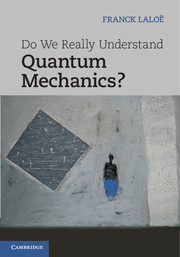Book contents
- Frontmatter
- Contents
- Foreword
- Preface
- 1 Historical perspective
- 2 Present situation, remaining conceptual difficulties
- 3 The theorem of Einstein, Podolsky, and Rosen
- 4 Bell theorem
- 5 More theorems
- 6 Quantum entanglement
- 7 Applications of quantum entanglement
- 8 Quantum measurement
- 9 Experiments: quantum reduction seen in real time
- 10 Various interpretations
- 11 Annex: Basic mathematical tools of quantum mechanics
- Appendix A Mental content of the state vector
- Appendix B Bell inequalities in non-deterministic local theories
- Appendix C An attempt for constructing a “separable” quantum theory (non-deterministic but local)
- Appendix D Maximal probability for a state
- Appendix E The influence of pair selection
- Appendix F Impossibility of superluminal communication
- Appendix G Quantum measurements at different times
- Appendix H Manipulating and preparing additional variables
- Appendix I Correlations in Bohmian theory
- Appendix J Models for spontaneous reduction of the state vector
- Appendix K Consistent families of histories
- References
- Index
Appendix C - An attempt for constructing a “separable” quantum theory (non-deterministic but local)
Published online by Cambridge University Press: 05 September 2012
- Frontmatter
- Contents
- Foreword
- Preface
- 1 Historical perspective
- 2 Present situation, remaining conceptual difficulties
- 3 The theorem of Einstein, Podolsky, and Rosen
- 4 Bell theorem
- 5 More theorems
- 6 Quantum entanglement
- 7 Applications of quantum entanglement
- 8 Quantum measurement
- 9 Experiments: quantum reduction seen in real time
- 10 Various interpretations
- 11 Annex: Basic mathematical tools of quantum mechanics
- Appendix A Mental content of the state vector
- Appendix B Bell inequalities in non-deterministic local theories
- Appendix C An attempt for constructing a “separable” quantum theory (non-deterministic but local)
- Appendix D Maximal probability for a state
- Appendix E The influence of pair selection
- Appendix F Impossibility of superluminal communication
- Appendix G Quantum measurements at different times
- Appendix H Manipulating and preparing additional variables
- Appendix I Correlations in Bohmian theory
- Appendix J Models for spontaneous reduction of the state vector
- Appendix K Consistent families of histories
- References
- Index
Summary
We give an example of such a non-deterministic local theory that looks similar to quantum mechanics, and actually even makes use of its formalism, while it is in fact significantly different. This theory includes the non-determinism of quantum mechanics, but gives to the state vector a role that is more local than in standard quantum mechanics. For this, we consider a physicist who has well understood the basic rules of quantum mechanics concerning non-determinism, but who remains sceptical about non-locality (or non-separability; for a detailed discussion of the meaning of these terms, see §3.3.3.b as well as, for instance, [24, 47]). This physicist thinks that, if measurements are performed in remote regions of space, it is more natural to apply the rules of quantum mechanics separately in these two regions. In order to calculate the probability of any measurement result, he/she will then apply the rules of quantum mechanics, in a way that is locally perfectly correct, but that also assumes that it is possible to reason separately in the two regions of space. If for instance the two measurements take place in two different galaxies, our sceptical physicist is prepared to apply quantum mechanics at the scale of a galaxy, but not at an intergalactic scale!
How can one then treat the measurement process that takes place in the first galaxy? It is very natural to assume that the spin it contains is described by a state vector (or by a density operator, it makes no difference here) that may be used to apply the orthodox formula for obtaining the probabilities of each possible result.
- Type
- Chapter
- Information
- Do We Really Understand Quantum Mechanics? , pp. 332 - 334Publisher: Cambridge University PressPrint publication year: 2012



